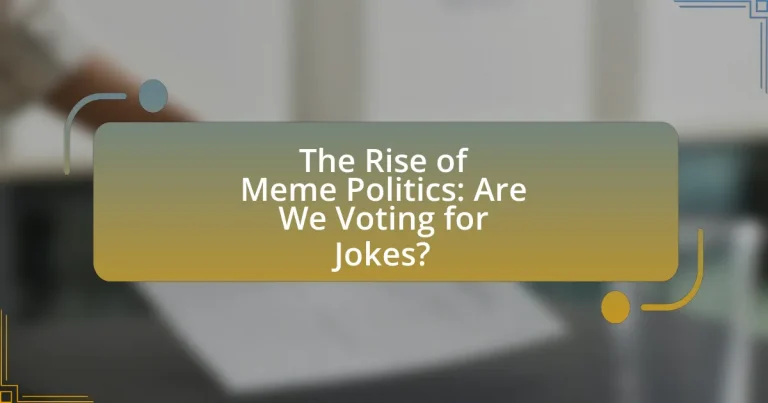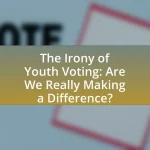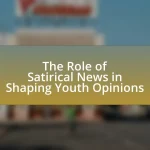Meme politics refers to the use of memes as a tool for political communication and influence, particularly in digital spaces, where they can shape public opinion and mobilize voters. This phenomenon has gained prominence with the rise of social media platforms, especially during events like the 2016 U.S. presidential election, where memes significantly impacted voter perceptions and engagement. The article explores how memes simplify complex political issues, their effectiveness in reaching younger demographics, and the risks associated with misinformation. Additionally, it examines the implications of meme politics on traditional political processes and the responsibilities of meme creators in ensuring accurate representation in political discourse.
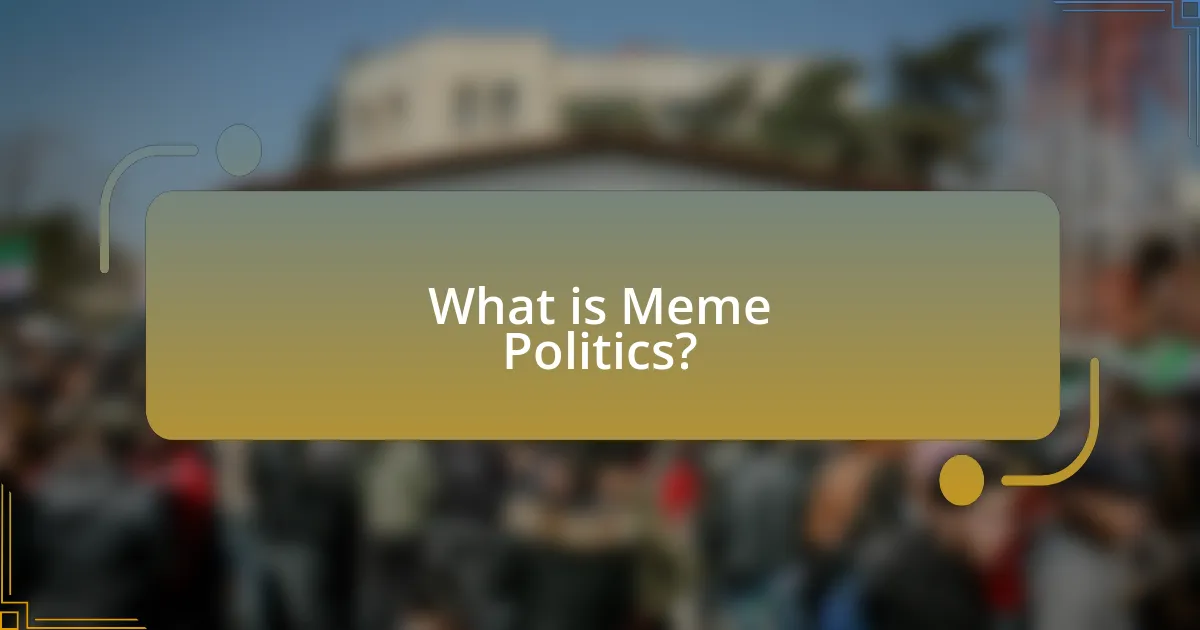
What is Meme Politics?
Meme politics refers to the use of memes as a tool for political communication and influence, particularly in digital spaces. This phenomenon has gained traction with the rise of social media platforms, where memes can quickly disseminate political messages, shape public opinion, and mobilize voters. For instance, during the 2016 U.S. presidential election, memes played a significant role in shaping narratives around candidates, demonstrating their power to engage younger audiences and create viral content that resonates emotionally.
How did Meme Politics emerge in the digital age?
Meme politics emerged in the digital age as a result of the rapid proliferation of social media platforms, which enabled the widespread sharing and creation of humorous and satirical content related to political events. The accessibility of meme creation tools and the viral nature of memes allowed individuals to engage in political discourse in a more relatable and entertaining manner. For instance, during the 2016 U.S. presidential election, memes played a significant role in shaping public perception, with platforms like Twitter and Facebook facilitating the rapid dissemination of political memes that influenced voter opinions and behaviors. This phenomenon illustrates how digital communication transformed traditional political engagement into a more informal and participatory process, where humor became a vehicle for political commentary and mobilization.
What role do social media platforms play in the rise of Meme Politics?
Social media platforms are crucial in the rise of Meme Politics as they facilitate rapid dissemination and engagement with political memes. These platforms, such as Twitter, Facebook, and Instagram, allow users to share, remix, and comment on memes, creating a viral cycle that amplifies political messages. Research indicates that memes can shape public opinion and political discourse, as evidenced by the significant role memes played in the 2016 U.S. presidential election, where they influenced voter perceptions and engagement. The interactive nature of social media encourages users to participate in political conversations through humor, making complex political issues more accessible and relatable.
How have memes changed the landscape of political discourse?
Memes have transformed the landscape of political discourse by enabling rapid dissemination of ideas and influencing public opinion through humor and satire. This shift is evident in the way memes simplify complex political issues, making them more accessible and engaging for a broader audience. For instance, during the 2016 U.S. presidential election, memes played a crucial role in shaping perceptions of candidates, with viral content often overshadowing traditional media narratives. Research from the Pew Research Center indicates that 55% of U.S. adults reported encountering political memes on social media, highlighting their prevalence and impact. Additionally, memes can create echo chambers, reinforcing existing beliefs and polarizing political views, as seen in the rise of meme-based communities on platforms like Reddit and Twitter.
Why are memes effective in political communication?
Memes are effective in political communication because they simplify complex ideas into easily digestible content that resonates with audiences. This simplification allows for rapid dissemination and engagement, as memes often utilize humor and relatable imagery to convey political messages. Research indicates that memes can enhance political awareness and mobilization, particularly among younger demographics who are more likely to share and interact with visual content on social media platforms. For instance, a study by the Pew Research Center found that 55% of social media users aged 18-29 have engaged with political content, including memes, highlighting their role in shaping political discourse.
What psychological factors make memes resonate with voters?
Memes resonate with voters primarily due to their ability to evoke emotional responses, simplify complex political issues, and foster social identity. Emotional engagement is crucial; memes often use humor, satire, or relatable content to create a connection with the audience, making political messages more memorable. Research indicates that emotionally charged content is more likely to be shared and retained, enhancing its impact on voter perception. Additionally, memes distill intricate political concepts into easily digestible formats, allowing voters to grasp key ideas quickly. This simplification aids in reducing cognitive load, making political discourse more accessible. Furthermore, memes often reflect and reinforce social identities, aligning with the values and beliefs of specific voter groups. This alignment fosters a sense of belonging and community, which can significantly influence voting behavior. Studies have shown that individuals are more likely to engage with content that resonates with their social identity, thereby increasing the likelihood of sharing and acting upon that content in a political context.
How do memes simplify complex political issues for the public?
Memes simplify complex political issues for the public by distilling intricate topics into easily digestible visual formats that convey humor and relatable messages. This simplification occurs because memes often use satire, irony, and cultural references, making them more accessible and engaging than traditional political discourse. Research indicates that the use of memes can enhance understanding and retention of political information, as they leverage emotional responses and social sharing to spread ideas rapidly. For instance, a study published in the journal “Political Communication” found that memes can effectively influence public opinion by framing political issues in a way that resonates with younger audiences, who are more likely to engage with visual content.
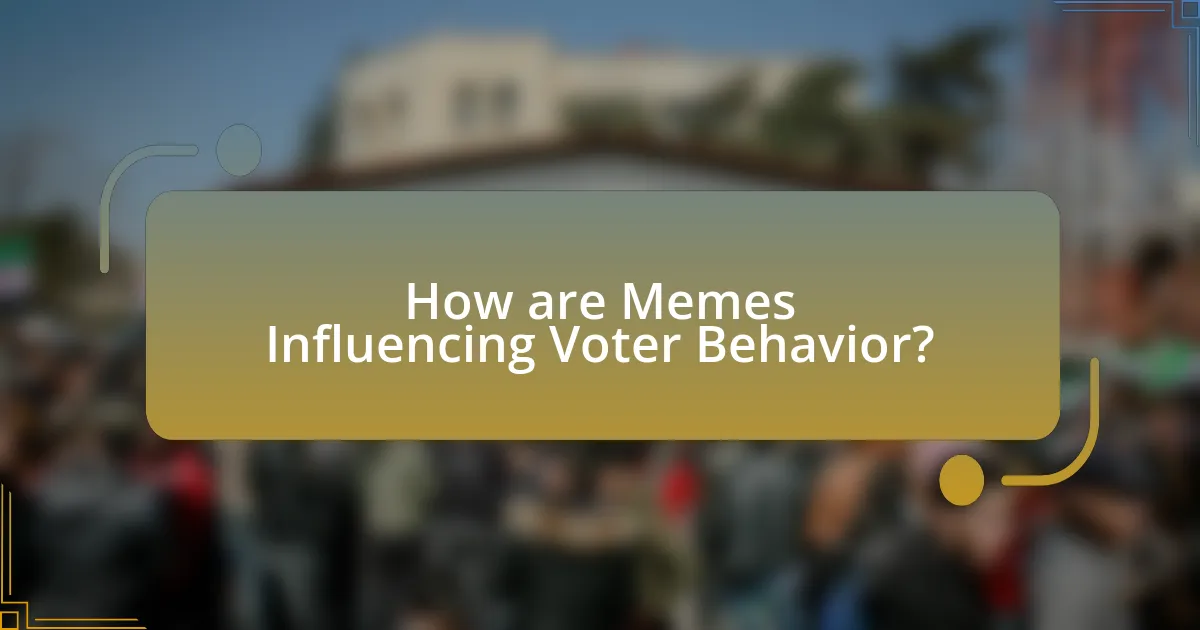
How are Memes Influencing Voter Behavior?
Memes are influencing voter behavior by shaping political narratives and mobilizing engagement among younger demographics. Research indicates that memes serve as a form of political communication that simplifies complex issues, making them more relatable and shareable. For instance, a study by the Pew Research Center found that 55% of young adults reported encountering political memes on social media, which often reflect and amplify their political beliefs. This engagement can lead to increased voter turnout, as memes encourage discussions and create a sense of community around shared political views.
What impact do memes have on political campaigns?
Memes significantly influence political campaigns by shaping public perception and engagement. They serve as a rapid means of communication, allowing candidates to convey messages succinctly and humorously, which can resonate with younger voters. For instance, during the 2016 U.S. presidential election, memes played a crucial role in amplifying candidates’ messages and mocking opponents, as evidenced by the viral spread of memes related to Donald Trump and Hillary Clinton. Research from the Pew Research Center indicates that 55% of social media users aged 18-29 reported encountering political memes, highlighting their effectiveness in reaching and mobilizing this demographic. Thus, memes not only enhance the visibility of political messages but also contribute to the overall narrative of campaigns, often influencing voter opinions and behaviors.
How do candidates utilize memes to engage with younger voters?
Candidates utilize memes to engage with younger voters by creating relatable and humorous content that resonates with their experiences and values. This approach leverages the viral nature of memes on social media platforms, where younger demographics are most active. For instance, during the 2020 U.S. presidential election, candidates like Bernie Sanders and Joe Biden effectively used memes to simplify complex political messages and foster a sense of community among supporters. Research indicates that 60% of young voters reported being influenced by social media content, including memes, highlighting their effectiveness in shaping political opinions and increasing voter turnout.
What are the risks of relying on memes in political messaging?
Relying on memes in political messaging poses significant risks, including the oversimplification of complex issues and the potential for misinformation. Memes often reduce nuanced political topics to easily digestible, humorous content, which can lead to a lack of critical engagement from the audience. This oversimplification can distort public understanding and hinder informed decision-making. Furthermore, memes can spread false information rapidly, as seen in various political campaigns where misleading memes gained traction on social media platforms, influencing voter perceptions and behaviors. For instance, during the 2016 U.S. presidential election, numerous memes circulated that contained inaccuracies, contributing to the spread of misinformation among voters.
Are memes shaping public opinion?
Memes are indeed shaping public opinion. Research indicates that memes serve as a powerful tool for political communication, influencing perceptions and attitudes among audiences. For instance, a study by the Pew Research Center found that 55% of social media users have encountered political memes, which often simplify complex issues and resonate emotionally, thereby swaying public sentiment. Additionally, memes can spread rapidly, creating viral moments that amplify specific viewpoints, as seen during elections where memes have been used to mobilize voters and frame narratives.
What evidence exists to support the influence of memes on voter attitudes?
Evidence supporting the influence of memes on voter attitudes includes studies demonstrating that memes can shape political opinions and mobilize voters. For instance, research conducted by the Pew Research Center in 2020 found that 55% of social media users reported that memes influenced their political views, particularly among younger demographics. Additionally, a study published in the journal “Political Communication” by researchers at the University of California, Irvine, indicated that memes can effectively convey political messages and increase engagement, leading to shifts in voter sentiment. These findings illustrate that memes play a significant role in shaping political discourse and voter attitudes.
How do memes contribute to the spread of misinformation in politics?
Memes contribute to the spread of misinformation in politics by simplifying complex issues into easily digestible content that can be rapidly shared and misunderstood. This simplification often leads to the distortion of facts, as memes frequently rely on humor or satire, which can obscure the truth. Research indicates that memes can spread false narratives more effectively than traditional news sources due to their viral nature on social media platforms, where users may prioritize entertainment over accuracy. For instance, a study published in the journal “Political Communication” found that memes can significantly influence public opinion by reinforcing existing biases and spreading misleading information, particularly during election cycles.
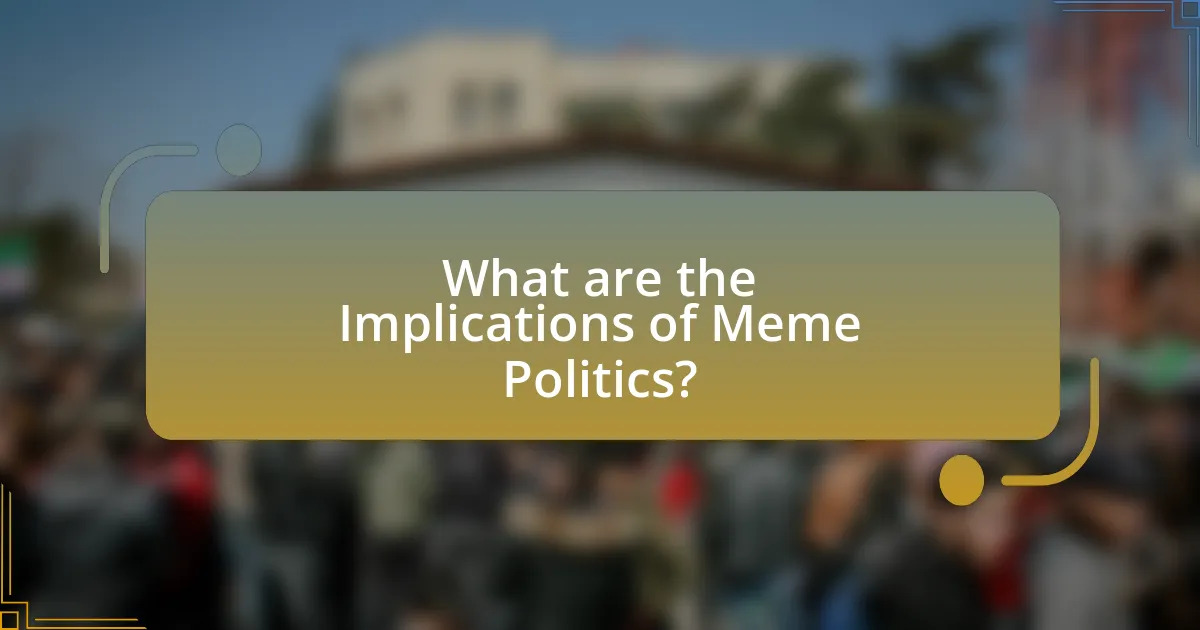
What are the Implications of Meme Politics?
Meme politics significantly influences public discourse and political engagement by shaping perceptions and mobilizing voter sentiment. Memes serve as a rapid means of communication, often simplifying complex political issues into easily digestible content that resonates with a broad audience. This phenomenon can lead to the spread of misinformation, as memes may distort facts for comedic effect, impacting voter knowledge and decision-making. Additionally, the viral nature of memes can amplify fringe viewpoints, potentially skewing political narratives and undermining traditional media’s role in informing the public. Studies indicate that social media platforms, where memes thrive, have become primary sources of news for many, further entrenching the implications of meme politics in shaping electoral outcomes and public opinion.
How does Meme Politics affect traditional political processes?
Meme politics significantly alters traditional political processes by shaping public discourse and influencing voter perceptions. Memes, as a form of digital communication, can rapidly disseminate political messages, often simplifying complex issues into easily digestible content. This phenomenon was evident during the 2016 U.S. presidential election, where memes played a crucial role in framing candidates’ images and policies, impacting voter engagement and opinions. Research by the Pew Research Center indicates that 55% of social media users encountered political memes, highlighting their prevalence and potential to sway public sentiment. Consequently, meme politics can undermine traditional campaigning methods by prioritizing viral content over substantive policy discussions, thus reshaping the landscape of political communication.
What challenges do political institutions face due to the rise of memes?
Political institutions face significant challenges due to the rise of memes, primarily in the areas of misinformation, public perception, and political polarization. Misinformation spreads rapidly through memes, often distorting facts and leading to misinformed public opinions, which can undermine trust in political institutions. For example, a study by the Pew Research Center found that 64% of Americans believe fabricated news stories cause confusion about the basic facts of current events. Additionally, memes can shape public perception by simplifying complex political issues into easily digestible content, which may lead to oversimplification and a lack of critical engagement with political discourse. This oversimplification can contribute to political polarization, as memes often reinforce existing biases and create echo chambers, making it difficult for institutions to foster constructive dialogue among diverse viewpoints.
How can political parties adapt to the meme-driven landscape?
Political parties can adapt to the meme-driven landscape by actively engaging with social media platforms to create relatable and shareable content that resonates with younger audiences. This approach is essential as studies show that memes significantly influence political discourse, particularly among millennials and Gen Z, who are more likely to share political content in meme form. For instance, during the 2020 U.S. presidential election, memes played a crucial role in shaping public perception and voter engagement, highlighting the effectiveness of this medium in modern political communication. By leveraging humor and cultural references, political parties can enhance their visibility and relatability, ultimately fostering a stronger connection with voters.
What ethical considerations arise from Meme Politics?
Meme politics raises significant ethical considerations, primarily concerning misinformation, manipulation, and the impact on public discourse. Misinformation can spread rapidly through memes, leading to the distortion of facts and the shaping of public opinion based on false narratives. For instance, during the 2016 U.S. presidential election, memes were used to propagate misleading information, influencing voter perceptions and decisions. Additionally, the manipulation of memes can exploit emotional responses, often prioritizing entertainment over informed debate, which undermines the democratic process. This phenomenon can lead to polarization, as memes often cater to specific ideological groups, further entrenching divisions within society.
How do memes challenge the integrity of political discourse?
Memes challenge the integrity of political discourse by distorting complex political issues into oversimplified and often misleading representations. This reductionism can lead to the spread of misinformation, as memes frequently prioritize humor and virality over factual accuracy. For instance, a study by the Pew Research Center found that 64% of Americans believe that fabricated news stories cause confusion about basic facts, illustrating how memes can blur the lines between truth and satire. Consequently, the reliance on memes in political discussions undermines informed debate and critical thinking, as nuanced arguments are replaced by catchy images and slogans that may not accurately reflect reality.
What responsibilities do meme creators have in political contexts?
Meme creators in political contexts have the responsibility to ensure that their content is accurate, respectful, and does not spread misinformation. Given the significant influence memes have on public opinion and political discourse, creators must critically evaluate the information they share, as memes can easily distort facts and contribute to polarization. For instance, a study by the Pew Research Center found that 55% of Americans have encountered false information about politics on social media, highlighting the potential impact of misleading memes. Therefore, meme creators should prioritize truthfulness and consider the societal implications of their work, as their creations can shape perceptions and influence voter behavior.
What can voters do to navigate Meme Politics effectively?
Voters can navigate Meme Politics effectively by critically evaluating the content and context of memes before forming opinions or making decisions. This involves verifying the accuracy of the information presented in memes, understanding the intent behind them, and recognizing their potential to oversimplify complex political issues. Research indicates that memes can significantly influence public perception and political discourse, as seen in the 2016 U.S. presidential election, where memes played a crucial role in shaping voter attitudes. By approaching memes with skepticism and seeking reliable sources for information, voters can mitigate the impact of misinformation and make informed choices at the polls.
How can individuals critically evaluate political memes?
Individuals can critically evaluate political memes by analyzing their source, context, and underlying messages. First, examining the origin of the meme helps determine its credibility; reputable sources are more likely to provide accurate information. Second, understanding the context in which the meme was created and shared is essential, as it can reveal biases or intentions behind the message. Lastly, dissecting the imagery and text within the meme allows individuals to identify emotional appeals, stereotypes, or misinformation. Research indicates that memes can significantly influence political opinions, as shown in studies like “The Memeing of Politics: The Role of Memes in Political Communication” by authors such as Limor Shifman, which highlights how memes shape public discourse.
What strategies can voters employ to discern fact from fiction in meme culture?
Voters can employ several strategies to discern fact from fiction in meme culture, including verifying sources, analyzing context, and cross-referencing information. Verifying sources involves checking the credibility of the original content creator or the platform where the meme originated, as reputable sources are less likely to spread misinformation. Analyzing context requires voters to consider the intent behind the meme and the circumstances surrounding its creation, which can reveal biases or exaggerations. Cross-referencing information with reliable news outlets or fact-checking websites helps confirm the accuracy of claims made in memes. Research indicates that misinformation spreads rapidly on social media, making these strategies essential for informed decision-making in the political landscape influenced by memes.
